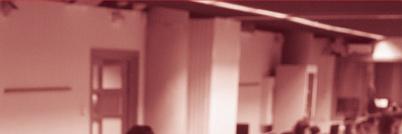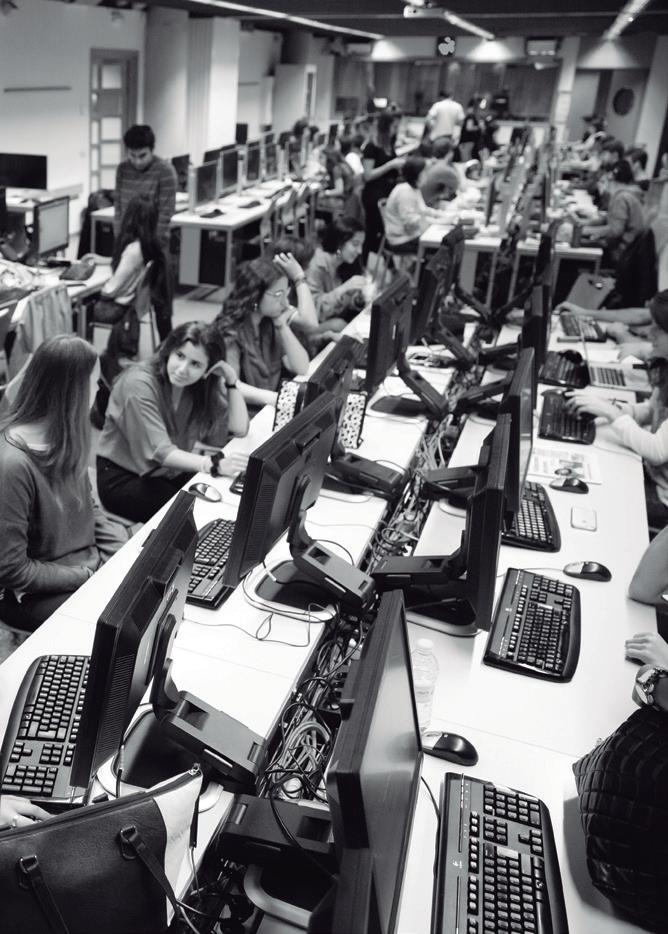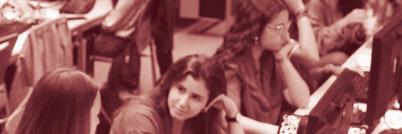









 A renovated textile factory houses all studies related to communication (technologies and contents) in the heart of the new technological district in Barcelona
A renovated textile factory houses all studies related to communication (technologies and contents) in the heart of the new technological district in Barcelona











 A renovated textile factory houses all studies related to communication (technologies and contents) in the heart of the new technological district in Barcelona
A renovated textile factory houses all studies related to communication (technologies and contents) in the heart of the new technological district in Barcelona
The three undergraduate programmes offered by the Faculty of Communication (Advertising and Public Relations, Journalism, and Audiovisual Communication) have traditionally required the highest admission marks in the Spanish university system and registered excellent rates of academic success Currently, the ratio of applicants to places for these programmes is one of the highest in the university system as a whole and also at UPF, with 4 applicants per place in Advertising and Public Relations, 3 in Audiovisual Communication, and 2.4 in Journalism (2021-2022 academic year).
Located on the campus, Tallers Area is a space designed for collaborative work, where teaching, research and the transfer of knowledge come together. It is a space where creativity, cultural experience, scientific dynamics and entrepreneurship are stimulated. Some of the strategic projects within the communication field that take place within this area are:
— Diari de Barcelona, a multichannel medium produced and conceived by UPF students following an agreement between Barcelona City Council and UPF
— The Tallers Gallery, an exhibition and cultural production space
— The “Under Construction” room, where students and professionals in the film industry can project their work on a big screen during the different phases of the production process
— The “In Residence” project, a program that hosts projects around the cultural, social and artistic industries
— 55% of official master’s students are international (2021-2022)
— 43% of doctoral students are international (2021-2022)
— 28% of graduates have studied abroad (2020-2021)*
— Internship agreements with more than 290 companies, such as RTVE (Spanish Radio and Television Corporation), El Periódico, El País, Europa Press, SER, La Vanguardia and Diagonal TV.
The UPF Department of Communication ranks among the most outstanding departments in this area in Spain in terms of both scientific output and its capacity to secure funding (see “Key figures” below).
The teaching and research activities take place at the Poblenou campus, which was built in 2009 and offers state-ofthe-art facilities. The campus is located in Barcelona’s 22@ district, the largest urban, economic and social transformation project the city has promoted in recent years. The district is home to modern technology areas and offices, as well as research, innovation and university education facilities, media business incubators, and residential areas for entrepreneurs, students and lecturers involved in the communications sector
— Horizon 2020:1 €3 million / 3 projects, including: — 1 ERC advanced grant (20182022): Transnational Gangs as Agents of Mediation: Experiences of conflict resolution in youth street organizations in Southern Europe, North Africa and the Americas (TRASNSGANG).
— Spanish R&D and Innovation Plan:2 €725,000 / 14 projects
* Lower than usual because of the pandemic.
1 Data refer to the 2014-2020 period only. They include individual and consortia projects.
2 Data refer to the 2015-2021 period only.
3 Data as of January 2022.
— International teaching staff:3 8%
— Theses defended in English: 15% (2020-2021)
— 3 industrial PhD projects funded by the catalan government (2013-2021)

— The Communication, Advertising and Society Research Group (CAS) focuses on topics at the intersection of two areas: communication and advertising, and the individual and society. The group studies communication phenomena not only from a communication perspective but also as an integrated system combining psychology, sociology, social psychology and discourse analysis.









— The main goal of the Center for Aesthetic Research on Audiovisual Media (CINEMA) is to serve as a venue for researchers from different fields to analyse both the history of cinema and contemporary manifestations of filmic events.







— Critical Communication Research Group (CRITICC). Drawing on a critical approach to communication and media studies, CRITICC’s researchers analyse the processes of communication ranging from interpersonal communication to hegemonic narratives in society, from a historical and structural approach.
— The Digital Documentation and Interactive Communication Research Group (DIGIDOC) is linked to two main lines of research: digital documentation and interactive communication. Each line is responsible for the maintenance of a related laboratory that pursues relevant projects such as “Analysis, design and conception of multimedia and interactive productions”
or “Analysis of the quality and characteristics of digital publications.”
— The Research Group in Science Communication (GRECC), which includes the Observatory of Scientific Communication, is interested in all communication processes that make it possible for specialized scientific knowledge to reach the general public.
— The main aim of the Research Group on Youth, Society and Communication (JOVIS.com) is to analyse contemporary youth from an interdisciplinary and transnational point of view. Its researchers are interested in gender, digital communication, identity, new technologies, social movements, political participation, youth policies, education, media literacy and social work.
— MEDIUM analyses popular media culture (video games, celebrities, television series, YouTube, fandom), both in terms of social discourse that popular culture conveys and for its potential for media education and
transmedia literacy. Likewise, MEDIUM’s researchers are interested in the evolution of the media ecosystem, media archaeology and mediation processes.
— The main objective of the Research Group on Political Communication, Journalism and Democracy (POLCOM-GRP) is the interdisciplinary study of the interrelationships between the political system, the media system and citizenship, and how these interactions affect the democratic culture of society.
— The Research Unit in Audiovisual Communication (UNICA) specializes in the field of audiovisual communication and culture.
— The main research lines of the Research Unit in Journalism and Digital Documentation are Ethics of journalism, History of journalism, Cyberjournalism, Digital documentation, Interactive communication, Scientific journalism, Dissemination of science and Political Communication.
The University has redesigned its spaces and turned them into multipurpose rooms capable of hosting all types of events (tutorials, group work, talks, co-working spaces, etc.) to cater for the needs of digital nativesThe Faculty of Communication has an extensive network of international contacts to invite visiting professors and increase the mobility opportunities for its students



At the undergraduate level, exchange agreements with 76 universities in 34 countries provide opportunities to study abroad and to internationalize the UPF’s own community at home. Some of the Faculty of Communication’s partner universities for these programmes include:
— Freie Berlin and Stuttgart Media universities (Germany)
— Queen Mary London and Stirling universities (UK)

— Sorbonne Nouvelle and Grenoble universities (France)
— Aarhus and Roskilde universities and the Denmark School of Journalism (Denmark)

— Tilburg, Radboud and Groningen universities (The Netherlands)
— Tampere University (Finland)
— University College Cork (Ireland)
— Università Roma Tre (Italy)
— IDC Herzliya University (Israel)

— Sogang University (South Korea)
— Several universities in Latin America
Indeed, the UPF Faculty of Communication has an excellent reputation in Latin America and attracts PhD students from throughout region. Europe is the other region in which the Faculty has strong and longstanding partnerships:






— Joint master’s degree in Strategic Communication and Public Relations with the University of Stirling (UK)

— International master’s degree in Audiovisual and Cinema Studies via an exchange network consisting of Paris Sorbonne Nouvelle, Udine, Sacro Coure Milan, Liège, Goethe, Bochum, Amsterdam, Paris Ouest, Charles de Gaulle, Montréal, Studi Roma Tre universities and Birkbeck College London
UPF appears on some of the most influential global rankings:


— 1st Spanish university, 156th worldwide and 69th in Europe (Times Higher Education ranking, 2022)
— 16th university in the world among universities aged 50 and under (Times Higher Education Young Universities Ranking, 2022)
— 1st university in Spain and 4th in Europe (U- Multirank, 2022)
The University also ranks high in communication:
— Among the top 150 universities in the world in communication and media studies (QS, 2022)
— Among the top 200 universities in the world in communication (Shanghai ranking, 2021)
— The bachelor’s degree in Audiovisual Communication offers general, plural, interdisciplinary education on the different realities involved in the creation of content for cinema, television, radio and interactive media. Combining theory and practice, it is geared towards students who wish to develop both their analytical skills and their creativity.
— The bachelor’s degree in Journalism aims to produce journalists capable of working in any medium. That entails preparing future graduates to adapt to the changes liable to take place in the communication arena in terms of both social uses and technology.
— The objective of the bachelor’s degree in Advertising and Public Relations is to produce highly rigorous and creative professionals capable of effectively meeting the needs of an ever-growing, dynamic sector characterized by constant innovation.
— Simultaneous Studies Programme: Humanities degree/ Journalism degree. This is a special degree programme covering two areas of study that allows students to earn two degrees (in Humanities and in Journalism) in a period of five years.
— The master’s degree in Contemporary Film and Audiovisual Studies aims to help students acquire the solid, critically proven knowledge and skills they need to begin to conduct research in the field of film studies with an emphasis on contemporary audiovisuals.
— The master’s degree in International Studies on Media, Power and Difference offers an opportunity to study and research the media’s role in the construction, representation and recognition of difference and diversity on the basis of the groups deemed most vulnerable.
— The master’s degree in Digital Culture and Emerging Media aims to provide students with advanced training to analyse the various social and cultural phenomena surrounding digital media, and to develop their own projects in this field through basic or applied research or research linked to the practice.
— The master’s degree programme in Communication Research provides advanced training aimed at academic specialization and initiation in research tasks in all areas of the field of social communication.The programme is designed to allow students to continue their postgraduate studies via the doctoral programme in Communication. To this end, it familiarizes them with the main research methods used in communication and the principal fields of research and study.
— The master’s degree in Strategic Communication & Public Relations is offered jointly with the University of Stirling The programme is designed to provide students with a solid international perspective on strategic communication, and allows them to study in Stirling, UK, and Barcelona, Spain. The programme is taught entirely in English, and, upon completion, students are awarded a joint degree from both institutions.
— The international master’s degree programme in Audiovisual and Cinema Studies (IMAC) aims to combine the 13 most prestigious and experienced universities in film theory in the same project. From the pooling of the various master’s degrees in film of each of the universities, belonging to 8 different countries (Spain, France, Italy, Belgium, United Kingdom, Holland, Germany and Canada), this initiative allows the students to do some of their training at their home university and complement it with two stages abroad.
— PhD programme in Communication
Barcelona UPF Campus
6. Poblenou Campus Roc Boronat, 138 08018 Barcelona Tel. +34 93 542 20 00 July 2022
5. Ciutadella Campus Ramon Trias Fargas, 25–27 08005 Barcelona Tel. +34 93 542 20 00 4
2. Mercè building Pl. de la Mercè, 10–12 08002 Barcelona Tel. +34 93 542 20 00 1 6 3 5 2
4. Mar Campus Doctor Aiguader, 80 08003 Barcelona Tel. +34 93 542 20 00